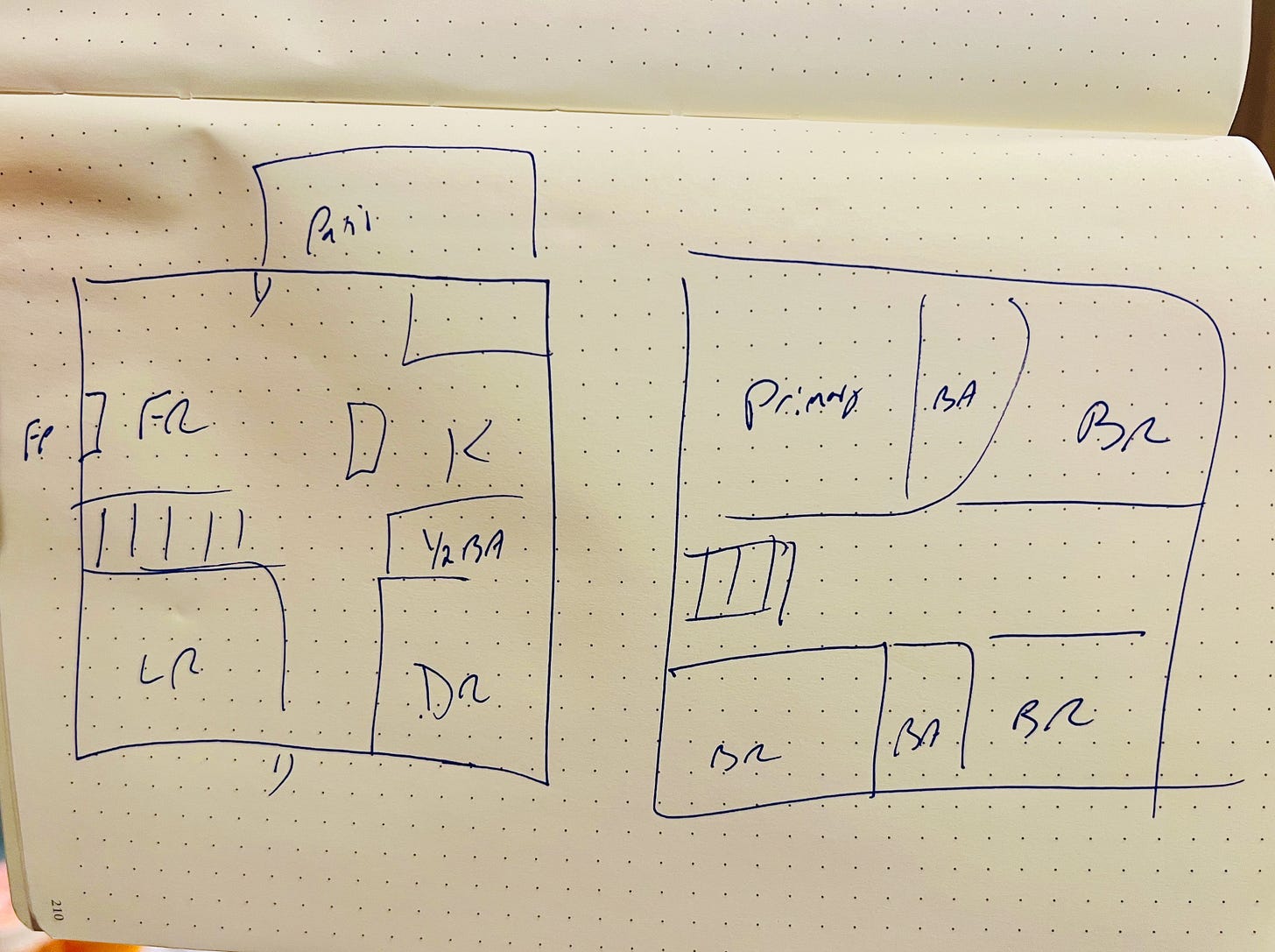We’re in a new market. You’re read the news, hopefully beyond the headlines. Rates are higher, inventory is higher but still low, and it’s a good time to reflect on other markets.
During the market crash in 2008, I showed a nice, formerly expensive house that had been foreclosed on. My clients didn’t buy that house, and I remember very little of the layout.
What I do remember is the feeling I had when I looked at the stairs to the front porch and saw one lacrosse stick leaning against the house. That’s it, just a lacrosse stick that represented a different time in that kid’s life.
I’ll never forget that, and want to ensure that I guide my clients through transactions so that they never leave behind something that important.
What’s happening in the market?
First, read/watch Mike’s analysis at Altos and Bill’s at Calculated Risk. While real estate is and always will be local, almost more than ever before, the national trends are reflecting what I’m seeing in our market.
More inventory, but not enough to satisfy demand.
Interest rates over 6% are absolutely affecting buyers’ affordability and sellers’ ability to meet their own pricing expectations.
Principal and interest payment on a $500k mortgage (30-year) (fixed):
@ 2.65% it'd be $2,015 (i.e. Jan. 2021)
@ 3.11% it'd be $2,138 (i.e. Dec. 2021)
@ 6.42% it'd be $3,134 (i.e. today)
Lots of new construction homes are under construction and I’m seeing price reductions, and hearing of cancellations. And people are still buying new homes because they need somewhere to live.
People are still moving to the Charlottesville area, and we’re still a pretty great place to live.
2023’s market is not going to be that of 2022, 2021, or 2020.
I wrote this in 2006; it holds true today.
One of the problems with the housing market is the constant tracking of the housing market. The market has never been an immediately-liquid investment, and it ought not to be treated as such. How many of you read every line of your quarterly IRA or 401(k) statements? Hopefully not, because those are intended to be long-term investments. So is housing. (2022 update: Look at my statements? Oh, hell no.)
The market is a bit like the axiom “a watched pot never boils.” We won’t know how the market is doing today until we look back from a six- to nine-month removed perspective. We can gain insight by looking at the numbers – interest rates, 10-year Treasury notes, pending sales, recent sales … but to get an accurate understanding, we have to look in the rear-view mirror.
… Do we really need to track the market on a daily, if not a seemingly hourly basis? Many contracts were written three, four, or six months ago. In reality, when analyzing the housing market, one is analyzing the past and attempting to project the future.
Questions about the market, or thinking of buying or selling? Ask me.
Next month: I’ll put together some market data. Any questions you’d like me to address?
The first $5K
My wife and I bought our first house nearly 25 years ago. As memory serves, my mom gave us $5,000. We got an FHA loan and put 3.5% down. Had she not given us that $5,000, we probably would not have been able to buy that house.
Looking back, I recognize the luck and privilege of having a parent able to help us out.
The $5,000 wasn't a huge amount, but it was more than we had, and it was what we needed. That five grand put us in a position to buy that first house, sell that first house, put the proceeds into our second house, subsequently sell that house, and put the proceeds into the house where we've been for nearly 20 years.
It started with a parent who had worked her ass off for a long time and who also owned a home.
I tell you this in the context of this story:
White adults are more than twice as likely as Black and Latino households to get sizable financial help from parents or other elders. That's according to a new poll by NPR, the Robert Wood Johnson Foundation, and the Harvard T.H. Chan School of Public Health.
Dorothy Brown, a tax law professor at Georgetown University, wishes more white families would talk about these intergenerational benefits.
You’re Friends - Can You Represent Us?
I may have written the story before — I’ve been writing this Note since 2014 — but I tell it all the time.
My two buyer clients and I were sitting at a table with a local builder and his agent.
After the meeting, my clients asked me a great question – not just because they were both attorneys, but because it's a great question: “We see that you and they are friends. Because you are friends, will you be able to effectively represent us if things get to the point where you need to be hard-nosed?”
Charlottesville is a small town. I do my job better because I know almost all of the good agents, almost all of the bad agents, and almost all of the local builders. I'm able to guide and advise my clients better because of it, and also know that agents and builders know, that while we are all friends, we all represent our respective parties.
This business is one of long-term client relationships, and I wouldn’t jeopardize clients for a single transaction.
Along those lines …
Working well with other agents is one of the untaught “soft skills” that is critical, unspoken, and difficult to articulate.
Example: House has been on the market for 37 days. Buyer client is curious if the seller would accept a lower price. Depending on the agent, I can have this conversation with the agent:
“Do you think they’ll take lower?”
“I think so; I’d encourage an offer.”
The agent is not violating client confidentiality or working against their client, but being truthful, and encouraging me to write that offer that might lead to buyer and seller coming to terms.
Alternatively, they could say, "Probably not. It's been on the market for a little bit, but we've gotten two offers that my client has rejected outright. My client might take something lower, but I doubt it."
That answer allows me to not waste my client’s time, mine, or the seller’s.
OR, the agent could say, “She’s rejected two offers, but she just told me to lower the price; it might be a good time to put something in.”
Every transaction is different, but the human management is always a component to be aware of.
Floorplans
Many years ago, floorplans were commonplace in the Charlottesville MLS. That stopped, I was told by an older agent, when a buyer apparently relied on a floorplan for something, the floorplan was wrong, the person sued, and floorplans disappeared.
Floorplans remain one of the most requested and most useful things for a buyer. I frequently say that I can more easily draw a floorplan from memory of a house I showed 10 years ago before I can remember my older daughter’s cell phone number.
Here’s one of mine (I know; I’m an artist):
But would that be illegal?
Maybe?
Related: U.S. Supreme Court Declines Review of Case Holding that Floor Plans are Entitled to Copyright Protection. And podcasts - Floor Plans and Copyrights Part 2 & Part 1 from VAR.
Paradox of choice.
My wife and I were in Charleston earlier this month for her birthday (Happy birthday! We both got Covid!)
One night, we were walking around and saw a hot sauce store. We kept walking; the prospect of choosing one was overwhelming. Another day, we were in a store and I bought vegetarian beef jerky (it’s delicious) and a bottle of the one hot sauce they had; it was good, and I’ve ordered more.
Sometimes, there are too many choices, and decision fatigue takes over. One of the many things I do for my buyer clients is keep them from wasting time seeing houses they won’t consider.
If you haven’t seen the Hurt Locker, I highly recommend this scene, and the entire movie.
“The biggest mistake that we make in marketing is that we believe that choice is a good thing.”
Story of a Buyer
This is a vague story of the value of experience and expertise, and knowing when to say you don’t know.
This is not about me, but about a first-time home buyer who hired an agent with no experience and no oversight, and whose counterpart in a transaction was also inexperienced and with little oversight. While not a disastrous outcome, there were challenges that should have not existed.
When I started practicing many years ago, I had no business representing clients; that's why I had a mentor – my mother – who was there to guide me, both in how I practiced and how I should not.
When you get good at anything, you tend to develop a sixth sense as to how things might go, and know when to ask questions. The most important sense to develop is that which tells you that the right answer is “I don’t know, but I’ll find out the answer.”
It's OK to be new at something. Everyone is new and untrained at some point. What’s not OK is to not disclose that to the client. (Disclosure: I wake up every day looking forward to learning something I don’t know).
Building for a world without cars
The annual cost of owning a new car is now five figures—not including the payments.
Imagine if you will, a world (or neighborhoods and part of a city, to start small) that was built to allow people to live without forcing them into cars.
I have no real point with this segment, but to suggest that we work together as a civilization to encourage more housing and commercial density, more bike lanes and e-bikes, sidewalks and trails, smaller firetrucks, and a built environment that doesn’t require owning two or one cars.
I usually have a couple of people skim or read this note before I hit publish – from “is this interesting?” to a thoughtful edit. Jennifer Brecht was first a client, then at some point we discussed her work as an editor. She’s edited this note for years, providing thoughtful, clarifying questions about word usage, as well as thinning out my copious comma usage.
In short, my writing comes out the other side cleaner and better and I highly recommend her; I like her URL too. EffectiveEditing.net.
What I’m Reading
Privacy advocates urge cancellation of Amazon’s nightmarish Ring Nation
30% Of Americans Cite Climate Change As A Motivator To Move In 2022
As climate change threatens more homes, some properties are getting too costly to insure
Insurance companies will lead the way. Eventually. Insurers force change on police departments long resistant to it
Your homeowners policy may address your condo special assessment. But don’t
How does nature nurture the brain? Study shows that a one-hour walk in nature reduces stress-related brain activity
What I’m Listening To
This Is Your Brain on Pollution - Some of the information here shocked me.
Ken Burns on Heroism, Horror, and History - terrifyingly relevant to today’s America.











